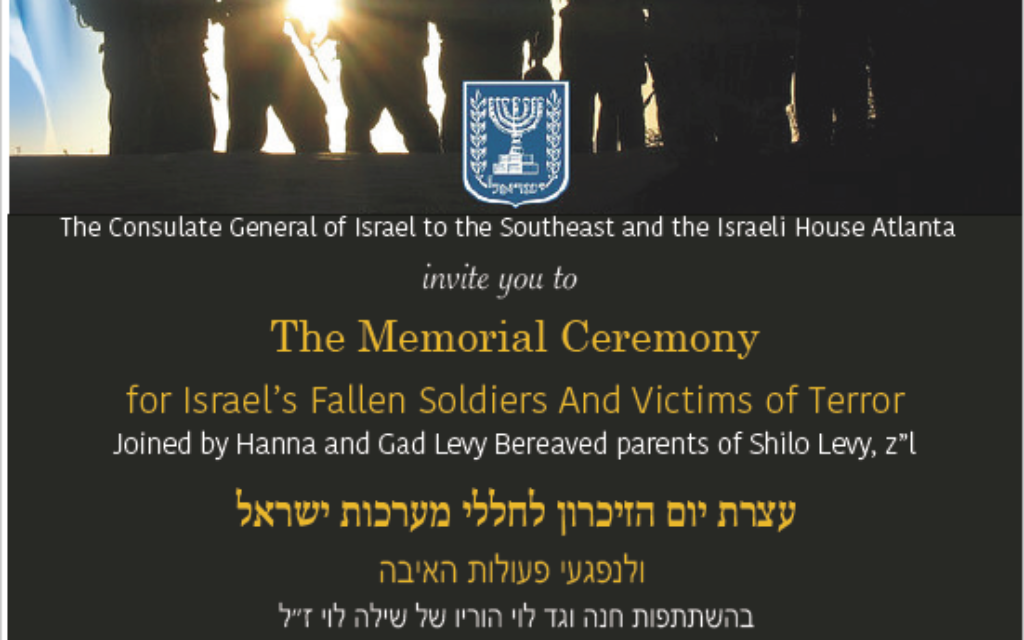A Day to Cross the Divide
We owe Israel’s fallen soldiers and terrorist victims our time and thoughts just as we do the victims of the Holocaust.
If you listen closely, you can hear a difference in how Israelis and American Jews sing the Israeli national anthem, “Hatikvah.”
I don’t have the musical vocabulary to describe the differences, but we Americans seem to try to smooth out the harsh melodic edges of the song.
This is the time of year when you get a lot of chances to hear “Hatikvah.” It’s the season of the yoms, the three modern observances created by Israel and adopted by the Diaspora: Yom HaShoah, Yom HaZikaron and Yom HaAtzmaut.
Get The AJT Newsletter by email and never miss our top stories Free Sign Up
Those commemorations are spread over nine days, a period one day longer than Passover, the story of our historical physical redemption, and one day shorter than the Days of Awe, the period of our annual spiritual redemption.
It’s easy to perceive a redemptive narrative in the passage from Yom HaShoah, Holocaust Remembrance Day, to Yom HaAtzmaut, Israeli Independence Day, as you can see in our observances in Jewish Atlanta.
Yom HaShoah this year began Sunday night, April 23, and we had two community commemorations that day: first at the Memorial to the Six Million at Greenwood Cemetery, then at the Marcus Jewish Community Center (moved inside from the Besser Holocaust Memorial Garden because of rain). As usual, Jewish Atlanta turned out in force for both.
Yom HaShoah-inspired events and discussions will continue through Sunday, April 30, when Congregation B’nai Israel in Fayetteville will host its annual shared Holocaust memorial service with Christ Our Shepherd Lutheran Church at 1:30 p.m.
Even as the Yom HaShoah events are wrapping up, we’ll be moving into celebrations of Yom HaAtzmaut, which officially runs from Monday night to Tuesday night, May 1 and 2.
Congregation Or Hadash is holding a community festival to mark Israel’s 69th birthday from 11 a.m. to 5 p.m. April 30.
On May 2, Jewish National Fund is holding its Jack Hirsch Memorial Breakfast at 7:30 a.m. at the Westin Atlanta Perimeter North and its women’s Independence Day Luncheon at 11:30 a.m. at the Dunwoody Country Club. That night, Temple Sinai is hosting a celebration with Hadassah at 6:15.
The fun keeps going at least through Thursday, May 4, when the Marcus Jewish Community Center and its partners turn Food Truck Thursday at Dunwoody’s Liane Levetan Park at Brook Run into an Israeli birthday party from 5 to 8 p.m.
It’s vital that we take time to remember the 6 million slaughtered by the Nazis and to celebrate the survivors while we still can, and it’s great that we have so many ways as a community to celebrate the ongoing miracle that is the state of Israel, flaws and all.
But there’s that third yom between the day of our deepest sorrow and the day of our greatest modern joy: Yom HaZikaron, Israel’s Memorial Day. That day intentionally covers the 24 hours immediately before Yom HaAtzmaut, as a reminder of the price Israelis have paid to establish and preserve the Jewish homeland as an independent nation. It’s a toll, including those killed in wars and those slain by terrorists, that is approaching 27,000 people.
Unfortunately, we Americans give short shrift to our own Memorial Day, which we think of more as the symbolic start of summer and a chance to find good deals on new cars than as the time to reflect on the sacrifices so many in our armed forces have made to protect the United States.
It’s hardly surprising, therefore, that we don’t respond to Israel’s Memorial Day, but it’s a mistake and a missed opportunity.
Until last year, I never thought about the fact that Jewish Atlanta, with our multiple Yom HaShoah and Yom HaAtzmaut observances, has only one Yom HaZikaron event, nor did I consider the makeup of the crowd for the memorial.
While I was sitting in the sanctuary at Ahavath Achim Synagogue, awaiting the start of the Yom HaZikaron service, an Israeli behind me went on a rant (in English, not Hebrew) about the lack of non-Israelis in attendance. He was angry and frustrated by Americans’ failure to understand that no day or service is more important to Israelis.
As I looked around at the many rabbis and communal leaders at the ceremony, I was defensive and dismissive about what I was hearing, but the Israeli was right. Take away the adults who were there professionally and the children who were participating with one day school or another, and Jewish Atlanta was largely absent.
I was reminded of former Israeli Deputy Consul General Ron Brummer’s frustration in his final interview with the AJT about the deep divide between Atlanta’s Israeli population, numbering as many as 15,000, and its non-Israeli Jewish population of more than 100,000. Nothing reflects and perhaps contributes to the gap between Israelis and non-Israelis like our response to Yom HaZikaron.
Americans recognize its importance but rarely take it to heart. Israelis, most of whom have served in the military and all of whom know or are related to some of the honored dead, live with the knowledge that they or their loved ones could be next. How could it not be personal and crucial?
This year’s Yom HaZikaron service is at 7:30 p.m. Sunday, April 30, at The Temple in Midtown. If you can be there, please attend. We owe Israel’s fallen soldiers and terrorist victims our time and thoughts just as we do the victims of the Holocaust, and we owe our Israeli friends and neighbors the respect of sharing the burden of memory.
Maybe one yom can help Israelis and non-Israelis get in tune.





comments